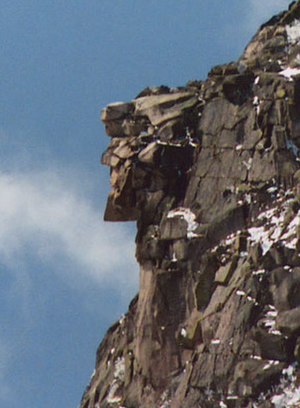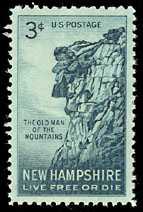Welcome to DU!
The truly grassroots left-of-center political community where regular people, not algorithms, drive the discussions and set the standards.
Join the community:
Create a free account
Support DU (and get rid of ads!):
Become a Star Member
Latest Breaking News
Editorials & Other Articles
General Discussion
The DU Lounge
All Forums
Issue Forums
Culture Forums
Alliance Forums
Region Forums
Support Forums
Help & Search
American History
Related: About this forumOn this day, May 3, 2003, the Old Man of the Mountain collapsed.
Old Man of the Mountain

Old Man of the Mountain on April 26, 2003, seven days before the collapse
The Old Man of the Mountain, also called the Great Stone Face and the Profile, was a series of five granite cliff ledges on Cannon Mountain in Franconia, New Hampshire, United States, that appeared to be the jagged profile of a human face when viewed from the north. The rock formation, 1,200 feet (370 m) above Profile Lake, was 40 feet (12 m) tall and 25 feet (7.6 m) wide.
The Old Man of the Mountain is called "Stone Face" by the Abenaki and is a symbol within their culture. It is also a symbol to the Mohawk people. The first written mention of the Old Man was in 1805. It became a landmark and a cultural icon for the state of New Hampshire. It collapsed on May 3, 2003. After its collapse, residents considered replacing it with a replica, but the idea was ultimately rejected. It remains a visual icon on the state's license plates and in other places.
History
{snip}
Post-colonial history

The Old Man of the Mountain in the early 1900s
The Old Man became famous across the United States largely because of statesman Daniel Webster, a New Hampshire native, who once wrote: "Men hang out their signs indicative of their respective trades; shoemakers hang out a gigantic shoe; jewelers a monster watch, and the dentist hangs out a gold tooth; but up in the Mountains of New Hampshire, God Almighty has hung out a sign to show that there He makes men."
The writer Nathaniel Hawthorne used the Old Man as inspiration for his short story "The Great Stone Face", published in 1850, in which he described the formation as "a work of Nature in her mood of majestic playfulness".
The profile has been New Hampshire's state emblem since 1945. It was put on the state's license plate, state route signs, and on the back of New Hampshire's statehood quarter, which is popularly promoted as the only US coin with a profile on both sides. Before the collapse, it could be seen from special viewing areas along Interstate 93 in Franconia Notch State Park, approximately 80 miles (130 km) north of the state's capital, Concord.
Collapse

A composite photograph of the Old Man of the Mountain, made of photos taken before and after the collapse.
Freezing and thawing opened fissures in the Old Man's "forehead". By the 1920s, the crack was wide enough to be mended with chains, and in 1957 the state legislature passed a $25,000 appropriation for a more elaborate weatherproofing, using 20 tons of fast-drying cement, plastic covering and steel rods and turnbuckles, plus a concrete gutter to divert runoff from above. A team from the state highway and park divisions maintained the patchwork each summer.
Nevertheless, the formation collapsed to the ground between midnight and 2 a.m., May 3, 2003. Dismay over the collapse was so great that people visited to pay tribute, with some leaving flowers.
{snip}

U. S. stamp issued in 1955. The plural version of the name is unusual.

The reverse of the state quarter of New Hampshire features the Old Man of the Mountain, alongside the state motto "Live Free or Die".

New Hampshire route markers continue to feature the profile of the Old Man of the Mountain.
{snip}

Old Man of the Mountain on April 26, 2003, seven days before the collapse
The Old Man of the Mountain, also called the Great Stone Face and the Profile, was a series of five granite cliff ledges on Cannon Mountain in Franconia, New Hampshire, United States, that appeared to be the jagged profile of a human face when viewed from the north. The rock formation, 1,200 feet (370 m) above Profile Lake, was 40 feet (12 m) tall and 25 feet (7.6 m) wide.
The Old Man of the Mountain is called "Stone Face" by the Abenaki and is a symbol within their culture. It is also a symbol to the Mohawk people. The first written mention of the Old Man was in 1805. It became a landmark and a cultural icon for the state of New Hampshire. It collapsed on May 3, 2003. After its collapse, residents considered replacing it with a replica, but the idea was ultimately rejected. It remains a visual icon on the state's license plates and in other places.
History
{snip}
Post-colonial history

The Old Man of the Mountain in the early 1900s
The Old Man became famous across the United States largely because of statesman Daniel Webster, a New Hampshire native, who once wrote: "Men hang out their signs indicative of their respective trades; shoemakers hang out a gigantic shoe; jewelers a monster watch, and the dentist hangs out a gold tooth; but up in the Mountains of New Hampshire, God Almighty has hung out a sign to show that there He makes men."
The writer Nathaniel Hawthorne used the Old Man as inspiration for his short story "The Great Stone Face", published in 1850, in which he described the formation as "a work of Nature in her mood of majestic playfulness".
The profile has been New Hampshire's state emblem since 1945. It was put on the state's license plate, state route signs, and on the back of New Hampshire's statehood quarter, which is popularly promoted as the only US coin with a profile on both sides. Before the collapse, it could be seen from special viewing areas along Interstate 93 in Franconia Notch State Park, approximately 80 miles (130 km) north of the state's capital, Concord.
Collapse

A composite photograph of the Old Man of the Mountain, made of photos taken before and after the collapse.
Freezing and thawing opened fissures in the Old Man's "forehead". By the 1920s, the crack was wide enough to be mended with chains, and in 1957 the state legislature passed a $25,000 appropriation for a more elaborate weatherproofing, using 20 tons of fast-drying cement, plastic covering and steel rods and turnbuckles, plus a concrete gutter to divert runoff from above. A team from the state highway and park divisions maintained the patchwork each summer.
Nevertheless, the formation collapsed to the ground between midnight and 2 a.m., May 3, 2003. Dismay over the collapse was so great that people visited to pay tribute, with some leaving flowers.
{snip}

U. S. stamp issued in 1955. The plural version of the name is unusual.

The reverse of the state quarter of New Hampshire features the Old Man of the Mountain, alongside the state motto "Live Free or Die".

New Hampshire route markers continue to feature the profile of the Old Man of the Mountain.
{snip}
InfoView thread info, including edit history
TrashPut this thread in your Trash Can (My DU » Trash Can)
BookmarkAdd this thread to your Bookmarks (My DU » Bookmarks)
2 replies, 903 views
ShareGet links to this post and/or share on social media
AlertAlert this post for a rule violation
PowersThere are no powers you can use on this post
EditCannot edit other people's posts
ReplyReply to this post
EditCannot edit other people's posts
Rec (4)
ReplyReply to this post
2 replies
 = new reply since forum marked as read
Highlight:
NoneDon't highlight anything
5 newestHighlight 5 most recent replies
= new reply since forum marked as read
Highlight:
NoneDon't highlight anything
5 newestHighlight 5 most recent replies
On this day, May 3, 2003, the Old Man of the Mountain collapsed. (Original Post)
mahatmakanejeeves
May 2023
OP
Goonch
(3,811 posts)1. Old Man of the Mountain (YouTube)
markie
(22,925 posts)2. I always
figured it was a strange thing to celebrate so actively... ![]()
I drive through the Franconia Notch quite often and can't say I miss it much... though the Notch is a must see if you're headed that way!!